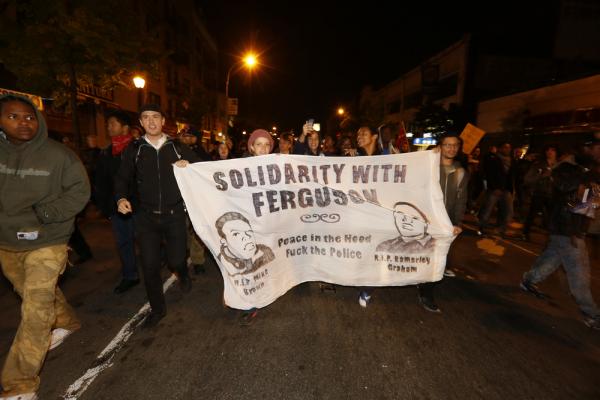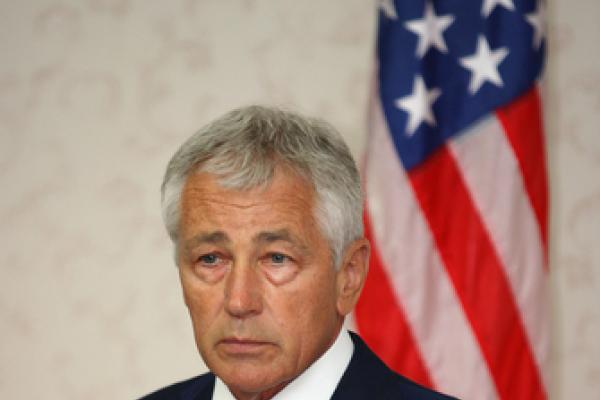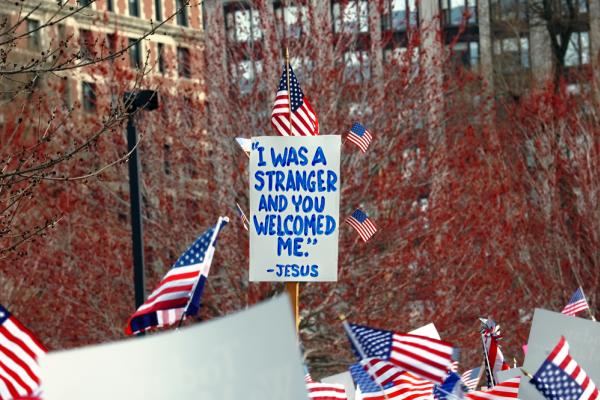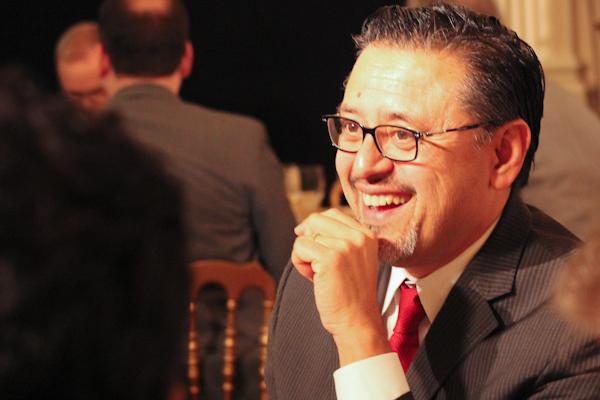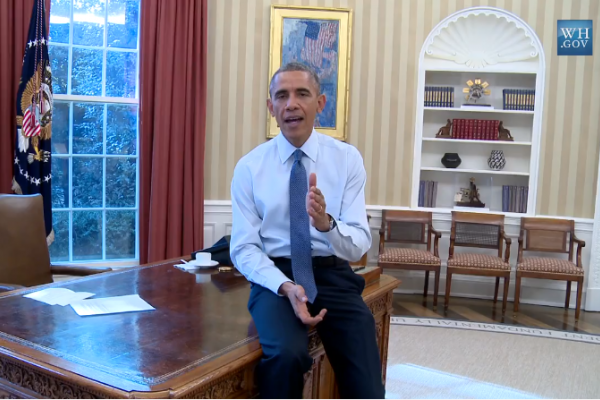In an intimate conversation between Jesus and his disciples, just before Jesus predicts that Peter will deny him three times, Jesus asks Peter, “Will you lay down your life for me?” As Jesus’ crucifixion approaches, his question to Peter becomes reality, and the people who know of Jesus or his movement must make a choice — to suffer and die with Jesus, or to slip away in fear and passivity — to welcome Christ, or to reject Christ.
Peter is certainly not the only one to face this decision. Judas must choose to betray Christ or not; the high priests must choose between power and mercy; Pilate must choose the approval of the people or trust his own conscience. These individuals, however, do not stand alone in their decision-making, but among one of the strongest but often overlooked characters in Scripture — the crowd. As Jesus stands before Pilate, it is not Pilate who truly holds power — it is the raging crowd before him that demands for the freedom of Barabbas and the crucifixion of Jesus.
When looking back on the crowd’s decision, it is easy to see how wrong it was until we begin to ask where we stand among the crowd in our time. In the case of Ferguson and the grand jury’s decision on Darren Wilson, most of us stand in the crowd, waiting to see what the grand jury and the state may do while we decide what we must do. All eyes are on the jury, yet many of us who are watching realize that the real power does not reside in Gov. Jay Nixon or the grand jury, but in us. Just as it is the crowd who sways Pilate to crucify Jesus, so it is we who can determine whether justice comes in Ferguson and everywhere where racism exists. As bell hooks writes, “Whether or not any of us become racists is a choice we make. And we are called to choose again and again where we stand on the issue of racism in different moments of our lives.” Today, we have another choice. The grand jury is under the spotlight, but we are all responsible.
Defense Secretary Chuck Hagel, the third Secretary of Defense to serve under President Obama, will resign under pressure from the White House, according to officials.
Former Senator Hagel is the only Republican serving on the president's national security team. Officials report Hagel struggled to be a strong voice at the Pentagon, but his removal may also be related to the recent midterm elections. According to MSNBC:
“He often had trouble articulating the details of many of the operations, many of the incantations, of what goes on here at the White House and he had a difficult time expressing those thoughts,” said NBC News' Jim Miklaszewski. “It appeared he sometimes didn’t even have a grasp of them. And quite frankly, according to one senior official, the White House and the DOD leadership pretty much lost confidence in Hagel.”
Pentagon officials and members of the administration have said Hagel struggled to lead at the Pentagon and be a strong voice within the president’s inner circle. Still, he is the not the first defense secretary to lose his job following midterm losses for the president he serves. Donald Rumsfeld also was fired by former President George H.W. Bush following midterm losses to the Republican party in 2006.
Read more here.
Don’t check your watch. This is something else all together. We know it will soon be the end of November and the end of Thanksgiving weekend. In the Christian calendar, it’s the beginning of Advent, the season leading up to Christmas. For many people, the time between Thanksgiving and Christmas is a tough time to get through. There are too many reminders of loss:
-the empty chair at the Thanksgiving table;
-the time when being alone turns to loneliness as everyone talks about family (some stores were closed on Thanksgiving to show support for families, but what if you are estranged from your family?)
-the bright red lettering over Macy’s front door proclaims “BELIEVE” — but believe what? The very word can remind you that you don’t believe anything anymore. What time is it in your life right now?
Can we be as honest as the Bible?
After a prayer service outside her church turned violent last month, the Rev. Teresa Danieley, pastor of St. John’s Tower Grove, allowed those trying to escape the demonstrations to enter her church.
Now, Danieley and dozens of other clergy members are preparing to once again offer their churches as safe spaces, or sanctuaries.
The grand jury decision on whether to indict Darren Wilson, the officer who fatally shot African-American teenager Michael Brown, is expected by the end of the month, potentially triggering further civil unrest. Clergy anticipate some might seek refuge in churches, whether to escape violence or find fellowship.
Organizations such as the Don’t Shoot Coalition, which was formed after the death of Brown, and Metropolitan Congregations United, a group of interdenominational, multiracial congregations from around the region, are in the process of creating a list of churches that are volunteering the use of their space. Many of these churches will be packed with supplies such as food, water, and phone chargers. Medics, legal observers and counselors will also be on hand.
Some believe that unless officers are needed in an emergency, churches should also function as police-free zones during protests.
I am a newly minted American. Four years ago I passed the naturalization test and took the oath of allegiance to the United States. But I had been living as a citizen before I took the oath. Those who do not have the legal status of citizen often act as citizens. They attend PTA meetings, pay taxes, and engage in spirited public discussions about the common good. Citizenship is not only a legal status, but also a moral category and a set of practices.
President Obama recognizes this. Last night’s address described executive actions that will protect up to five million people from deportation and provide them with permits to work legally. People without valid immigration documents will be eligible to stay in the country temporarily if they have lived in the United States for more than 5 years, if they have children who are American citizens or legal residents, and if they register and pass criminal background checks.
Obama is not offering people citizenship, but his address reflected on the meaning of community belonging. “These people” often act like citizens, he seemed to be saying, because they “came to work, and study, and serve in our military, and above all, contribute to America's success.” To those of us who are citizens legally, Obama also had a message: Become better Americans.
Churches have spent millions attempting to cater to the needs of the young families in their communities.
"Come here! Bring your kids! We have a replica-sized Noah's Ark with real, live animals — a coffee shop that sells Pumpkin Spice lattes — cupholders in the chairs and state-of-the-art acoustics."
From a Millennial mom: this stuff is great. We like it, especially the lattes. But what we really want — what we really need — might not cost a thing.
When I started about a year ago as pastor of a small Lutheran church in the Chicago suburbs, one of my first priorities was to re-start the moms group that had been meeting at the church.
At one time it had served almost as a preschool drop-off. Later it had been held down by one mom and her friends, and as their children grew up no one came to fill the void.
I wanted to make it more than a drop-off, though — I wanted it to be Christian with a capital C. I made some tongue-in-cheek flyers with a black and white photo of a crying baby holding a Bible, and I called it Babies and Bibles.
Then, on a few Thursday mornings, I brought Jake to the church. A few curious moms emailed and showed up, but it never really took off.
Meanwhile, I missed the close-knit moms group I had in California, where Jake was born.
I was in the process of giving it all up for awhile, when one day as I drove to church God spoke to me:
"Why are you holding this at the church?" God asked. "It should be at your house."
Most Americans say they feel a deep connection to the wider world.
But all that spiritual stargazing makes no difference in views about the facts of climate change and global warming, a new survey finds.
Just 5 percent of Americans thought climate change was the most important issue in the U.S. today. And religion was a major dividing point on how much — or how little — they think it’s a matter of concern, according to a new survey by the Public Religion Research Institute.
“We asked about spiritual measures such as being in awe of the universe, and you might think it would correlate with views about the universe. But, in fact, they have very little relationship,” said Robert Jones, CEO of PRRI, which conducted the survey on U.S. adults’ attitudes toward climate change, environmental policy and science.
While Republican leaders blast President Obama for taking executive action on immigration reform, some prominent evangelical leaders are welcoming the president’s plans to keep about 5 million undocumented immigrants from being deported.
Evangelicals are a key voting bloc for the GOP, but on immigration some are taking a pragmatic step away from the party. They include Hispanic leaders such as the Rev. Samuel Rodriguez who say the time has come to manage what has become a “de facto humanitarian crisis” for millions of immigrants.
“This merciful action takes place because for years our government, under the leadership of both parties, failed miserably as it pertains to immigration,” said Rodriguez, president of the National Hispanic Christian Leadership Conference.
Rodriguez planned to be with Obama on Nov. 21 in Las Vegas, where the President hopes to rally for his new steps.
Editor's Note: Thursday evening, President Barack Obama announced he is taking action to reform pieces of our broken immigration system. See Sojourners President Jim Wallis' recap here. Below are President Obama's remarks as prepared for delivery.
My fellow Americans, tonight, I’d like to talk with you about immigration.
For more than 200 years, our tradition of welcoming immigrants from around the world has given us a tremendous advantage over other nations. It’s kept us youthful, dynamic, and entrepreneurial. It has shaped our character as a people with limitless possibilities – people not trapped by our past, but able to remake ourselves as we choose.
But today, our immigration system is broken, and everybody knows it.
Families who enter our country the right way and play by the rules watch others flout the rules. Business owners who offer their workers good wages and benefits see the competition exploit undocumented immigrants by paying them far less. All of us take offense to anyone who reaps the rewards of living in America without taking on the responsibilities of living in America. And undocumented immigrants who desperately want to embrace those responsibilities see little option but to remain in the shadows, or risk their families being torn apart.
Tonight, faith leaders and all those who have spent years trying to fix our broken immigration system should feel gratitude toward President Obama. In a primetime address to the nation, the president announced he was taking executive action to relieve some of the suffering caused by the failures of the status quo. Millions of families will no longer live under the daily threat of having their lives torn apart by senseless deportations, which is something all Christians – whether Republican or Democrat – should celebrate. Many of our brothers and sisters in Christ, who have spent significant portions of their lives hiding in the shadows, can now enjoy the flourishing God intends for us all. Their joy and well-being must inform our judgments of the president’s action, especially in light of the biblical call to “welcome the stranger.”
Unfortunately, the president’s compassionate actions are creating a political firestorm among some Republicans in Washington. Their anger and antipathy toward the White House are blinding them to the positive effects these measures will have for our society. Even after decades living and working in our nation’s capital, I’m still amazed at the many ways political ideology can prevent us from having “eyes that see” and “ears that hear.” I lament that our political discourse has come to this.
Everyone agrees the only way to find sustainable, long-term solutions is through Congress passing bipartisan legislation. The Senate did exactly that more than 500 days ago, but their honest efforts have languished in the House of Representatives because of Republican intransigence. GOP leaders promised alternative policy ideas; reform garnered widespread, nationwide support — including among a majority of Republicans; faith leaders were hopeful after countless positive conversations with members of Congress; the president even told me that he was “optimistic” about reform after conversations with Speaker John Boehner; the country, and, more importantly immigrant families, patiently waited — yet, the House failed to act.
